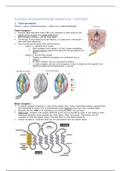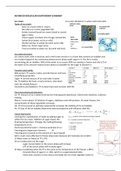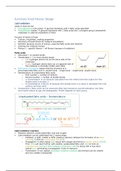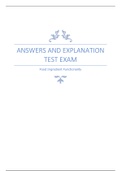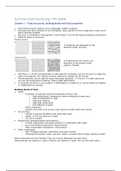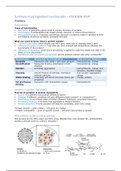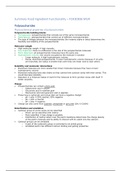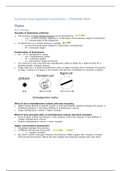Wageningen University (WUR) • Master Food Technology
Meest recente samenvattingen voor de opleiding Master Food Technology op de Wageningen University (WUR). Op zoek naar een samenvatting voor Master Food Technology? Wij hebben diverse samenvattingen voor de opleiding Master Food Technology op de Wageningen University (WUR).
-
60
-
163
-
2
Vakken Master Food Technology op de Wageningen University (WUR)
Er zijn samenvattingen beschikbaar voor de volgende vakken van Master Food Technology op Wageningen University (WUR)
- FCH 30306 Food Ingredient Functionality 1
- FCH-30306 Food Ingredient Functionality FCH30306 5
- Food Chemistry FCH20806 1
- Food Digestion: Fermentation & Gut Health FCH32306 2
- Food Digestion: fermentation and gut health FCH32306 1
- Food Fermentation FHM21806 1
- Food Flavour Design FQD37806 4
- Food Ingredient Functionality FPE30306 7
- Food Structuring FPE30306 3
- Food stucturing FPE-30306 1
- Food Toxicology TOX30306 1
- FPE30306 FPE30306 1
- FQD31806 1
- FQD37806 FQD37806 2
Nieuwste samenvattingen Wageningen University (WUR) • Master Food Technology
Summary of the course Advanced Molecular Gastronomy (Master Food Technology, WUR). This summary is about the Chemistry part. Subjects are: - Taste perception - Bitterness in beer - Umami and taste enhancement - Sweetness and sweeteners - Astringency - Beer foam - Bubbles in bread - Crystal control in ice cream
summary of all lectures and knowledge clips of the course of 2020/2021
Summary for the course Food Flavour Design (Wageningen University) Content: - Lipid oxidation - Fermentation - Maillard reaction - Flavour experience in the body - Taste and odour receptors - Impact of oral processing behaviour and oral physiology on flavour release and perception - Drivers of flavour perception - Flavour release as function of product formulation - Physics behind flavours - Flavour application - Impact of food product architecture and cross-modal interactions on flavou release ...
all lectures of the food structuring course (chapters I-VI)
This free document provides extra explanations on the answers of the test exam Food Ingredient Functionality. About the subjects Polysaccharides, Proteins and Physcial aspects. Written in oktober 2020. Master Food Technology (Wageningen University and Research). Also have a look at my other summaries for this course!
Summary of the course Food Structuring (FPE-30306) at Wageningen University (Master Food Technology) Content of summary: - Food structures, building blocks and food properties - State diagram and the glass transition - Crystallization and matrix formation - Barrier technology - Emulsions: Principles and preparation - Structuring of biopolymer products Written in oktober 2020
Don't feel like reading all 58 pages of the reader Food Ingredient Functionality? This summary describes all theory of the Protein part (reader, knowledgde clips, lectures) in just 6 pages! The content of the summary is: - Functionality - Variation in protein ingredients - Milk proteins - Protein modification - Other food proteins - Interaction between proteins - Solubility - Foam and emulsion properties - Viscosity, thickeners and gels Course: Food Ingredient Functionality Master Food Techno...
Don't feel like reading all 41 pages of the reader Food Ingredient Functionality? This summary describes all theory of the Polysaccharides part (reader, knowledgde clips, lectures) in just 10 pages! The content of the summary is: - Physicochemical properties of polysaccharides - Analytical techniques - Pectin - Alginate - Carrageenan - Galactomannans - Starch - Xanthan gum - Gellan gum - Curdlan - Gum Arabic - Cellulose - Xyloglucan - Selection of polysaccharides - Food hydrocolloid diversity ...
Don't feel like reading all 48 pages of the reader Food Ingredient Functionality? This summary describes all theory of the Physics part (reader, knowledgde clips, lectures) in just 6 pages! The content of the summary is: - Bulk rheology - Interactions in food - Gels - Emulsions - Foams Course: Food Ingredient Functionality Master Food Technology Wageningen University & Research Written in oktober 2020

